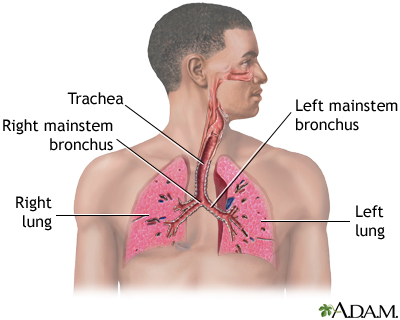Respiratory alkalosis
Alkalosis - respiratory
Respiratory alkalosis is a condition marked by a low level of carbon dioxide in the blood due to breathing excessively.

Air is breathed in through the nasal passageways, travels through the trachea and bronchi to the lungs.
Causes
Common causes include:
- Anxiety or panic
- Fever
- Overbreathing (hyperventilation)
- Pregnancy (this is normal)
- Pain
- Tumor
- Trauma
- Severe anemia
- Liver disease
- Central nervous system (brain) abnormalities
- Overdose of certain medicines, such as salicylates, progesterone
Any lung disease that leads to shortness of breath can also cause respiratory alkalosis (such as pulmonary embolism and asthma).
Symptoms
Exams and Tests
Your health care provider will perform a physical exam. Tests that may be done include:
- Arterial blood gas, which measures oxygen and carbon dioxide levels in the blood
- Basic metabolic panel
- Chest x-ray
- CT scan of the chest
- Pulmonary function tests to measure breathing and how well the lungs are functioning
Treatment
Treatment is aimed at the condition that causes respiratory alkalosis. Breathing into a paper bag -- or using a mask that causes you to re-breathe carbon dioxide -- sometimes helps reduce symptoms when anxiety is the main cause of the condition. However, this method has recently been questioned by experts, especially when there is actual lung disease not just anxiety or a panic attack causing the respiratory alkalosis. Ask your provider what approach is best for you.
Outlook (Prognosis)
The outlook depends on the condition that is causing the respiratory alkalosis.
Possible Complications
Seizures may occur if the alkalosis is extremely severe. This is very rare and more likely to happen if the alkalosis is due to increased ventilation from a breathing machine.
When to Contact a Medical Professional
Contact your provider if you have any symptoms of lung disease, such as long-term (chronic) cough or shortness of breath.
References
McCoin NS, Self WH. Acid-base disorders. In: Walls RM, eds. Rosen's Emergency Medicine: Concepts and Clinical Practice. 10th ed. Philadelphia, PA: Elsevier; 2023:chap 113.
Sanghavi S, Albert TJ. Acid-base balance. In: Broaddus VC, Ernst JD, King TE, et al, eds. Murray and Nadel's Textbook of Respiratory Medicine. 7th ed. Philadelphia, PA: Elsevier; 2022:chap 12.
Seifter JL. Acid-base disorders. In: Goldman L, Cooney KA, eds. Goldman-Cecil Medicine. 27th ed. Philadelphia, PA: Elsevier; 2024:chap 104.
Version Info
Last reviewed on: 8/19/2024
Reviewed by: Allen J. Blaivas, DO, Division of Pulmonary, Critical Care, and Sleep Medicine, VA New Jersey Health Care System, Clinical Assistant Professor, Rutgers New Jersey Medical School, East Orange, NJ. Review provided by VeriMed Healthcare Network. Also reviewed by David C. Dugdale, MD, Medical Director, Brenda Conaway, Editorial Director, and the A.D.A.M. Editorial team.
